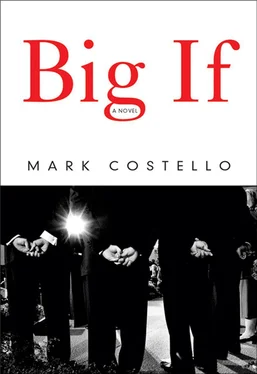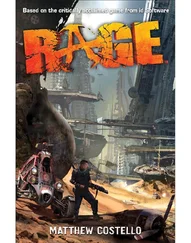Vi had heard a fair amount about Lloyd Felker, who had written the white papers Vi had studied on her bunk. He had been a line guy, a decorated veteran of the Reagan team. He’d earned his decorations on a rainy morning in March 1981, when a movie-addled drifter by the name of John W. Hinckley, Jr., opened up on Reagan outside the Hilton on Connecticut Northwest. Hinckley hit the chief-of-detail, Tim McCarthy, in the gut, hit a cop named Delahanty in the neck, hit the press secretary in the skull, hit Reagan in the chest, and it was Felker and another agent, Tashmo, who bundled Reagan to the waiting limousine, sped to the hospital, and probably saved his life.
Something in the mess and narrow miss drove Felker into theory. He moved up to Beltsville as an analyst in Plans. He spent the next twenty years teaching doctrine to recruits and writing his white papers. Toward the end of Felker’s great career as a protection intellectual, he was asked to draft a plan for a presidential trip to Pakistan. He wrote a memo, circulating it division-wide for comments and criticism. The plan was vintage Felker, meticulous, obsessive, nothing left to chance, but it had one glaring flaw — or not a flaw exactly, more of an anomaly: it was, or seemed to be, a plan for how to kill the president in Pakistan. The other analysts, being thorough men, ran some crosschecks by computer simulator and concluded that it would probably work.
Felker didn’t need computer simulations. “Of course it works,” he said. “You think I’d circulate my fantasy?”
The other planners didn’t understand. Why write a plan to kill — what purpose could it serve?
Felker said, “What purpose? We write our plans to counter plans hatched and set in motion days or weeks or months or maybe years before, or not at all — we can’t know this until later, so we counterplan against the plan as if the plan exists. But what is the plan? We have no idea. We’re a house of critics with no poet. Someone in this outfit needs to think along these lines. I make a plan, a murder plan; you counterplan against it. I find the holes; you plug them. It’s scientific peer review. I destroy your work and if I can’t, your work is sound.”
Felker pitched his concept to the bosses and the bosses fell in love. They were fatally attracted to the cloak-and-dagger end of things, and besides, it was Felker pitching it, and wasn’t he the author of the Dome? How could he be wrong on this? So they funded him, freed him from his teaching load, even gave him his own office, a vacant bunker in the cornfields on the windy ridge above the campus quad.
Felker reached the bunker in the cornfield by a long path through the stalks, and in the winter when there was no corn, there was no path. His fellow analysts would see him from their offices, a figure in the mist, loping through the stubble, scattering the crows.
He assigned himself the budget and skill level of your average terror group or one of your better survivalist militias, and he tried to make real-world assumptions. He wrote every kind of murder plot there was. He wrote clockwork operations, he wrote messy-but-effective. He wrote missiles, he wrote rifles, he wrote foreign-soil bombs. He wrote banquet poisonings (the key was fast-release, he said, deceptive symptomology, get them to mismedicate, waste those precious hours). He wrote fake policemen, he wrote gas attacks, he wrote deadly viri delivered in a child’s popped balloon. Sometimes he played the jihadin, indy or state-sponsored, sometimes the white supremacists, sometimes the right-to-lifers, sometimes the Shining Path. Sometimes he played the loner in the bunker, the kid with voices in his head and a pistol in his pocket, the simplest of threats and the hardest to defend against. He didn’t write too many of these kids. There was really only one of them, he said, and nothing you could do except track them out of Beltsville, build a database of faces, mag your chokepoints, weapon-sweep, and prebrief your body team to read the ropelines carefully. The murder plots were detailed to the second, to the footstep, point-of-contact and escape, and each of them, he said, was completely non-impossible.
As he found the holes, the other planners plugged them. He studied these counterplans, wrote counter-counterplans to beat them, which forced the planners to produce counter-counter-counterplans. The Dome was getting stronger, but it was also getting bigger, more unwieldy, less controllable, and therefore weaker too, and maybe this was Felker’s point from the beginning.
He circulated fifty-eight plots, one for every Certainty, plus one. They were gathered in a kind of Devil’s Bible, a heavy, softbound volume — gathered, admired, and quickly classified, each page stamped in red, Beltsville: Sensitive . Eventually, he started finding holes the planners couldn’t plug. The bosses panicked and they shut him down. The goons from Human Resources went through every safe, every inbox, every C-drive on the campus, confiscating every copy of the Sensitives. Another team of goons went through the bunker in the corn, burning Felker’s files. Notes and charts and diagrams — they burned them in the dirt outside the bunker. They went a little heavy on the charcoal lighter fluid, and the fire leapt, and some of the cornstalks caught and burned like standing torches. The fire spread from ear to ear, leaping on the breeze, and the goons were flummoxed, flapping their suit coats, barking in their radios, throwing dirt like boys at play, and Felker helped them put it out. They erased his disks and the C-drive on his PC, but Felker, trying to be helpful, told them that you can’t erase a C-drive — you have to overwrite it basically. He was explaining what he meant by overwrite and the goons lost patience. They took his PC to the mock parking lot and hit the thing with baseball bats until it was in pieces, then hit the pieces until they were in bits, then jumped up and down on the bits, looking like Sicilians making wine. Felker held their coats, watched impassively, and ate an ear of roasted corn he had salvaged from the dirt.
They told Felker to go back to making normal sort of plans, building on his Certainties, but he couldn’t do it anymore. He asked for, then demanded, a transfer to the line, and they made him Gretchen’s deputy lead agent.
Vi had heard the story of the Beltsville Sensitives from planners who had been there at the time. Later, when she joined the VP’s team and started traveling, she often saw Lloyd Felker eating grapefruit and bran cereal an hour before dawn in the corner of a hotel coffee shop in Iowa or Texas or wherever they were staying. Sometimes he ate with Gretchen or with old Tashmo, Felker’s buddy from the Reagan days, but if he was alone, Vi went over to him with her muffin on a tray and asked if she could sit. Felker always looked up, happily surprised — like, there are twenty empty tables in the place, why would you prefer to sit with me?
Vi liked the guy. He was lonely — she could sense it. He talked about his family, his wife and son in Maryland, and how much he missed them when he traveled. Vi asked him what had happened with the Sensitives, thinking he’d be bitter at the Service for suppressing his last, iconoclastic works, but Felker wasn’t bitter.
“I was glad to leave,” he said. “I was through with theory anyway. There is no theory, really. There’s only what we do, day after day.”
Gretchen drove her people hard, late winter into spring. They went to Iowa, New Hampshire, back and forth to Florida, stumping through the neocities of the Super Tuesday states, Raleigh — Durham, Dallas — Fort Worth, Tampa — St. Pete, all the hyphenated places, and they always seemed to put the airports in the hyphen, the perfect equidistance between centers, the linking nothingness, the land of ramps, arrival and departure, long-term parking, rental car returns, a stack of arrows on a sign, the sign floating overhead, too fast to read the options and the arrows too. Felker was a help in such a landscape; he always checked the airports on the Web and knew their maps by heart.
Читать дальше












